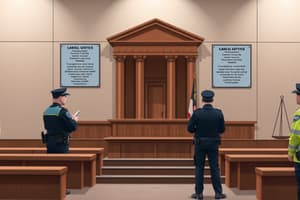Podcast
Questions and Answers
Which court generally handles lesser offences?
Which court generally handles lesser offences?
- Crown Court
- Supreme Court
- Magistrates Court (correct)
- High Court
Appeals from the Crown Court can go directly to the High Court.
Appeals from the Crown Court can go directly to the High Court.
False (B)
What is the primary purpose of the civil justice system?
What is the primary purpose of the civil justice system?
To deal with cases of a civil matter such as personal injury or breaches of contract.
The administrative system focuses on challenges against public or governmental ______.
The administrative system focuses on challenges against public or governmental ______.
Match the following courts with their functions:
Match the following courts with their functions:
Which division of the High Court includes the Administrative Court?
Which division of the High Court includes the Administrative Court?
The Court of Justice of the European Union (CJEU) makes determinations of cases based on the facts presented.
The Court of Justice of the European Union (CJEU) makes determinations of cases based on the facts presented.
What is one impact of the Human Rights Act 1998 while it remains in force?
What is one impact of the Human Rights Act 1998 while it remains in force?
The High Court has three divisions, including the Family Division, the Queen's Bench Division, and the __________ Division.
The High Court has three divisions, including the Family Division, the Queen's Bench Division, and the __________ Division.
Match the following courts with their respective jurisdictions:
Match the following courts with their respective jurisdictions:
Study Notes
Court Divisions
- The court structure in England and Wales is generally divided into three divisions: criminal, civil, and administrative.
Criminal Division
- The criminal justice system focuses on prosecuting individuals accused of criminal offenses.
- The Crown (represented by Regina or R in case names) is the second party in such cases.
- Cases typically begin in the Magistrates' Court, where bail hearings are held to determine if the accused should be held in custody or released.
- Less serious offenses are heard in the Magistrates' Court before lay magistrates or a single judge.
- More serious offenses are heard in the Crown Court, or, in certain cases, the accused can elect for their case to be heard there.
- Appeals from the Magistrates' Court proceed to the Crown Court, then to the High Court (on points of law only), and ultimately to the Court of Appeal or the Supreme Court.
- First instance cases in the Crown Court are appealed to the Court of Appeal (Criminal Division) and potentially to the Supreme Court.
Civil Division
- The civil justice system handles civil matters like personal injury claims or breaches of contract between parties.
- Small claims are brought in the County Court, while larger claims can be brought in either the County Court or the High Court.
- Appeals from the County Court go to the High Court, then to the Court of Appeal (Civil Division) and ultimately the Supreme Court.
Administrative Division
- This division handles challenges against public or governmental decisions.
- Judicial review cases challenge actions or decisions of public bodies (like welfare and immigration tribunals).
- The First Tier and Upper Tier immigration tribunals are responsible for a high number of decisions annually.
Court Jurisdiction
- The High Court in England and Wales has inherent jurisdiction, meaning its powers aren't conferred by statute and can't be easily removed by legislation.
- The High Court has three divisions: Family Division, Queen's Bench Division, and Chancery Division.
- The Administrative Court, where judicial review cases are heard, is part of the Queen's Bench Division.
Appeals and International Influences
- The UK Supreme Court is the final court of appeal in England and Wales, Northern Ireland, and Scotland.
- Cases involving European Union law can be appealed to the Court of Justice of the European Union (CJEU), which makes interpretive decisions and sends them back to domestic courts for factual determination.
- The UK is also a member of the European Convention on Human Rights, which currently binds its courts through the European Court of Human Rights (ECHR) in Strasbourg.
- The UK Government has announced plans to repeal the Human Rights Act 1998, potentially changing the relationship between UK courts and the ECHR.
- The UK courts must follow the Strasbourg Court's "clear and constant jurisprudence" unless special circumstances apply.
Studying That Suits You
Use AI to generate personalized quizzes and flashcards to suit your learning preferences.
Description
Explore the structure and functions of the criminal division within the court system of England and Wales. This quiz covers the processes involved from the Magistrates' Court to the Crown Court and the appeal system. Test your knowledge on how criminal cases are handled and the roles of various courts and parties involved.




